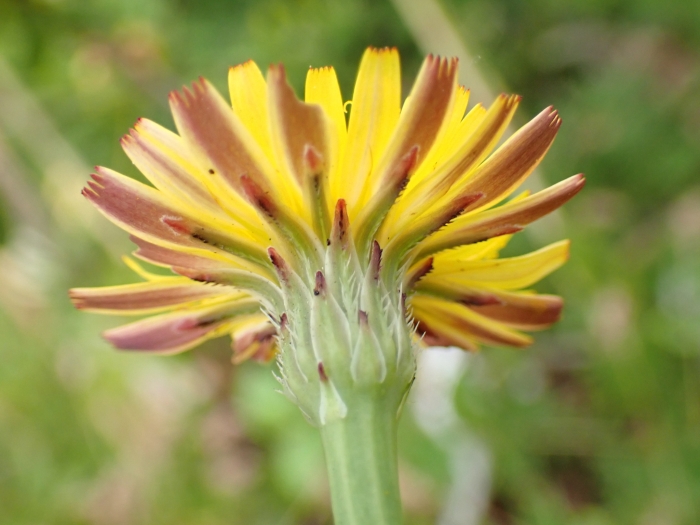Catsear
(Hypochaeris radicata)
Catsear (Hypochaeris radicata)
/
/

Sus scrofa
CC BY 4.0
Image By:
Sus scrofa
Recorded By:
Copyright:
CC BY 4.0
Copyright Notice:
Photo by: Sus scrofa | License Type: CC BY 4.0 | License URL: http://creativecommons.org/licenses/by/4.0/ | Rights Holder: Sus scrofa | Publisher: iNaturalist | Date Created: 2023-06-03T14:09:51-07:00 |






















Estimated Native Range
Summary
Hypochaeris radicata, commonly known as catsear or false dandelion, is a perennial herb that is native to meadows and grassy areas of Europe and North Africa. It has naturalized in many parts of the world, including the Americas, Japan, Australia, and New Zealand. The plant typically grows up to 8 inches tall, forming a basal rosette of oblong leaves. From spring to autumn, it produces forked stems topped with bright yellow composite flowers that resemble those of true dandelions. The flowers are modest in size but can be quite numerous, creating a noticeable display in the landscape.
Catsear is valued for its edible qualities; the leaves can be used fresh in salads or cooked like spinach, and the roots may be roasted and ground as a coffee substitute. It is a hardy plant that can thrive in a variety of soil types, though it prefers well-drained conditions and full sun to partial shade. In cultivation, it can be used as a ground cover or in wildflower meadows. However, gardeners should be aware of its potential to spread aggressively, especially in regions outside its native range. Hypochaeris radicata can become invasive, outcompeting native vegetation and altering ecosystems.CC BY-SA 4.0
Catsear is valued for its edible qualities; the leaves can be used fresh in salads or cooked like spinach, and the roots may be roasted and ground as a coffee substitute. It is a hardy plant that can thrive in a variety of soil types, though it prefers well-drained conditions and full sun to partial shade. In cultivation, it can be used as a ground cover or in wildflower meadows. However, gardeners should be aware of its potential to spread aggressively, especially in regions outside its native range. Hypochaeris radicata can become invasive, outcompeting native vegetation and altering ecosystems.CC BY-SA 4.0
Plant Description
- Plant Type: Shrub, Herb
- Height: 0.5-2 feet
- Width: 0.5-1 feet
- Growth Rate: Slow, Moderate
- Flower Color: Yellow
- Flowering Season: Spring, Summer
- Leaf Retention: Deciduous
Growth Requirements
- Sun: Full Sun
- Water: Medium
- Drainage: Medium, Slow
Common Uses
Edible*Disclaimer: Easyscape's listed plant edibility is for informational use. Always verify the safety and proper identification of any plant before consumption., Low Maintenance, Showy Flowers
Natural Habitat
native to meadows and grassy areas of Europe and North Africa
Other Names
Common Names: False Dandelion, Flatweed
Scientific Names: , Hypochaeris radicata, Hypochaeris ambigua, Hypochaeris radicata f. radicata, Hypochaeris radicata subsp. erostris, Hypochaeris radicata subsp. rostrata, Hypochaeris radicata var. erostris, Hypochaeris radicata var. leiocephala, Hypochaeris radicata var. radicata, Hypochaeris radicata var. vulgaris
GBIF Accepted Name: